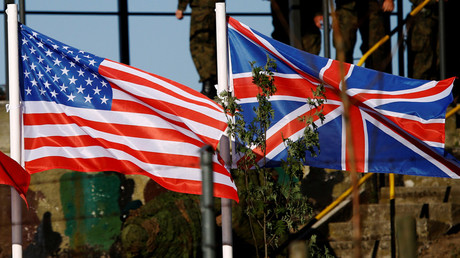British soldiers embedded in Okinawa could breach US-Japan treaty

A Freedom of Information (FoI) request by the Japan Times has revealed that two Royal Marines officers have been embedded with the US Marines at a base in Okinawa since January 2015.
Their presence is apparently in contravention of an international military deal that does not contain a provision for the training of third-country forces.
According to the disclosure, the marines have been deployed at USMC Camp Schwab and USMC Camp Hansen.
As part of a program agreed upon by the US and UK, the FOI shows marines have “conducted jungle and range training.”
The US uses Okinawa’s Yanburu forest for jungle exercises.
The 56-year-old Japan-US Security Treaty allows US troops to be stationed in Japan, but does not generally allow third country troops to be stationed at the bases.
There are seven exceptions for installations classified as United Nations Forces facilities, but the two USMC camps where the Royal Marines have been based are not among these.
The revelation that unauthorized troops from a country other than the US have been present on the bases has drawn angry responses from Okinawan politicians.
A spokesman for the Okinawan prefecture told the Japan Times: “If everybody starts freely using [US bases in Okinawa], there’ll be no stopping it.”
“Whether the Japanese government tacitly gave permission [for this training] or did not know about it, it’s a big problem.”
“The [treaty] does not allow third-country nationals to use US bases in Japan for training,” Japanese Ministry of Defense spokesperson Hirofumi Takeda said, appearing to confirm that a violation of the treaty had taken place.
Other Japanese officials then appeared to backtrack, saying they were checking on the status of and circumstances surrounding the UK soldier’s presence in their country.
The British troops’ secret deployment in Japan may also have something to do with the US’ “Pivot to Asia,” a fashionable term for the West’s strategic refocus on a rising China – not least in the wake of the EU referendum.
Writing in the Telegraph in July, King’s College London history and foreign policy professor John Bew said the UK must prepare for its future role in Asia by tying itself more closely to US global aims as the delicate Brexit negotiations are carried forward.
“In undergoing its own ‘pivot to Asia,’ the UK is likely to face dilemmas, as well as great opportunities, which require careful consideration,” he argued.
“The first question is whether Britain will want to expand the remit of its engagement with the region from trade to also encompass Asian security and political questions,” Bew wrote.


No comments:
Post a Comment